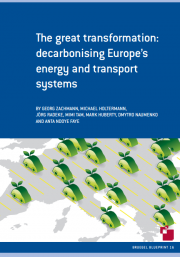
The Great Transformation: Decarbonising Europe’s Energy and Transport Systems

The euro-area crisis dominates the economic news. Yet, the world and Europe may face even more important challenges that will shape our lives and the lives of our children.World population is projected to increase to 9 billion or more by 2050. At the same time, current trends indicate an increase in living standards and a growing middle class around the world. These two mega-trends will have profound implications, and the way they are managed will be one of the key determinants of prosperity and peace in the decades or even centuries to come. A number of factors are important in this respect.
More people and more income will increase the global demand for energy. Choosing the right sources of this energy will be one of the determining factors of global temperature.
The continued reliance on fossil-fuel energy sources is one of the main factors behind the risk of significant global temperature increases. The internationally agreed goal of limiting the temperature rise to less than two degrees Celsius above pre-industrial levels appears increasingly illusory. Currently, fossil energy sources dominate many economic areas. For instance, our transport infrastructure is largely based on fossil fuels, and is thereby one of the main contributor of the carbon dioxide emissions that are linked to global temperature. Thinking about a decarbonisation strategy is therefore a key challenge with a global dimension.
Economic growth in Europe will be affected by the costs of this transition from the current energy and transport system. A smooth transition towards a low-carbon energy and transport system could come at comparatively modest cost. Furthermore, identifying the most economically beneficial solutions early on and becoming a global technology leader and standard setter offers vast opportunities for exports and economic growth. Hence, our decarbonisation strategy may eventually have a greater impact on long-term European growth than the current economic crisis.
Bruegel is contributing to this debate with this report, which is based on research that received funding from the Fuel Cell and Hydrogen Joint Undertaking. The authors argue carefully that to make decarbonisation growth friendly, a consistent policy approach is needed. Policy intervention appears indispensable as the energy and transport system is so based around and locked-in into an incumbent technology. Overcoming this lock-in is crucial. The report makes three main proposals. First, the scope, geographical coverage and duration of carbon pricing should be extended.
- Issues:
- Infrastructure, Energy, Natural Resources, Technological innovation
- Region:
- Europe
- Year Published:
- 2012
- Authors:
- Georg Zachmann, Michael Holtermann, Jörg Radeke, Mimi Tam, Mark Huberty, Dmytro Naumenko, Anta Ndoye
- Institution:
- Bruegel

